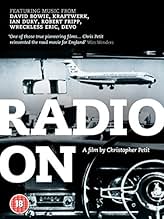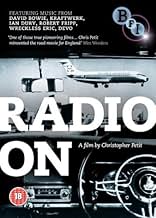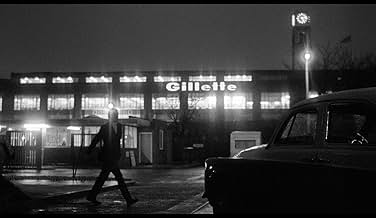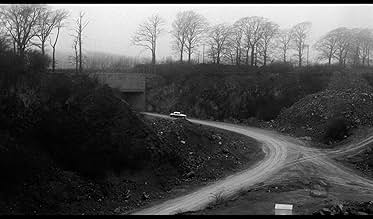Radio On
- 1979
- 1h 44m
IMDb RATING
6.5/10
1.3K
YOUR RATING
In 1970s Britain, a man drives from London to Bristol to investigate his brother's death, and the purpose of his trip is offset by his encounters with a series of odd people.In 1970s Britain, a man drives from London to Bristol to investigate his brother's death, and the purpose of his trip is offset by his encounters with a series of odd people.In 1970s Britain, a man drives from London to Bristol to investigate his brother's death, and the purpose of his trip is offset by his encounters with a series of odd people.
- Awards
- 1 win & 1 nomination total
Featured reviews
Opening scene: like a badly lit YouTube video with camera tracking around a dingy flat in the dark.
A lot of dinge. Silences devoid of talking but staring from back of head off out into alienated nowheres.
Perpetual gloom is hungover every scene. This is England of 1979. Looking as bleak and despondent as I remember it. Thatcher the milk-snatcher had just come to power.
Not just dark and dim, but dull the first time i saw it. The plot is minimal and pointless (i.e beside the point) Concerned more with observational detachment than motivational character development. It's got a morose London Dj driving his Rover past monolithic tower-blocks out towards the desolate west country. Listening to Kraftwerk tapes sent by dead brother.
Dj like an alienated mopey nobody passively drifts into and out of various encounters of estrangement with other alienated mopey no-bodies (Sting still tries to be Sting though as a solitary and subdued petrol attendant singing Eddie Cochran on guitar).
This is Wim Wenders country. The existential road movie switched from soul-less autobahn to empty A4. Wenders cinematographer (Martin Schafer) is doing all the b/w monochrome melancholy with the camera. Even got Liza Kreuzer from Alice in the Cities looking for her daughter Alice (from Alice in the Cities?). Maybe she's in Weston-Super-Mare. Lets go there.
This has become a cult film. Critics liked it because it tried to be different, i.e the same as their beloved Wim. A cool German art-house sensibility transplanted to 1970′s England. Makes it feel like a depressingly depressive place. Even more depressingly depressive than it is now.
A lot of dinge. Silences devoid of talking but staring from back of head off out into alienated nowheres.
Perpetual gloom is hungover every scene. This is England of 1979. Looking as bleak and despondent as I remember it. Thatcher the milk-snatcher had just come to power.
Not just dark and dim, but dull the first time i saw it. The plot is minimal and pointless (i.e beside the point) Concerned more with observational detachment than motivational character development. It's got a morose London Dj driving his Rover past monolithic tower-blocks out towards the desolate west country. Listening to Kraftwerk tapes sent by dead brother.
Dj like an alienated mopey nobody passively drifts into and out of various encounters of estrangement with other alienated mopey no-bodies (Sting still tries to be Sting though as a solitary and subdued petrol attendant singing Eddie Cochran on guitar).
This is Wim Wenders country. The existential road movie switched from soul-less autobahn to empty A4. Wenders cinematographer (Martin Schafer) is doing all the b/w monochrome melancholy with the camera. Even got Liza Kreuzer from Alice in the Cities looking for her daughter Alice (from Alice in the Cities?). Maybe she's in Weston-Super-Mare. Lets go there.
This has become a cult film. Critics liked it because it tried to be different, i.e the same as their beloved Wim. A cool German art-house sensibility transplanted to 1970′s England. Makes it feel like a depressingly depressive place. Even more depressingly depressive than it is now.
Filmed in black and white with some great imagery; I love how this film looks with its art-house styling. There is a pretty good soundtrack with songs from the likes of David Bowie, Ian Dury, Kraftwerk and Devo
amongst others. All the performances were good but all delivered in a very 'matter of fact' manner. David Beames took centre stage as Robert with Lisa Kreuzer playing Ingrid. Sandy Ratcliff was Kathy and Andrew Byatt the Deserter but (for me) the star turn was a brief cameo from Sting as the Eddie Cochrane loving petrol pump attendant.
I must admit I was somewhat disappointed by this film. I expected a little more focus on the music for one thing and the fact that everyone in Bristol seemed to speak with a London accent didn't help! It has a very slow pace which I was prepared to accept as long as something happened. Sadly, apart from one bright sequence featuring Sting, not a lot seemed to. There are also sequences where the majority of the dialogue is in German, with no subtitles; very odd! I will give the filmmakers credit for some excellent imagery showing just how bleak an English winter can be (even in the South). Over all I'd say one for lovers of art-house films for them, Recommended for the general cinebuff maybe not.
My Score 6.4/10
IMDb Score: 6.3/10 (based on 296 votes at the time of going to press).
MetaScore: NO DATA: (Based on 0 critic reviews provided by Metacritic.com at the time of going to press).
Rotten Tomatoes 'Tomatometer' Score: NO DATA (based on 0 reviews counted at the time of going to press).
Rotten Tomatoes 'Audience' Score: 12/100 'Want to See' (based on 625 user ratings counted at the time of going to press).
You can find an expanded version of this review on my blog: Thoughts of a SteelMonster.
I must admit I was somewhat disappointed by this film. I expected a little more focus on the music for one thing and the fact that everyone in Bristol seemed to speak with a London accent didn't help! It has a very slow pace which I was prepared to accept as long as something happened. Sadly, apart from one bright sequence featuring Sting, not a lot seemed to. There are also sequences where the majority of the dialogue is in German, with no subtitles; very odd! I will give the filmmakers credit for some excellent imagery showing just how bleak an English winter can be (even in the South). Over all I'd say one for lovers of art-house films for them, Recommended for the general cinebuff maybe not.
My Score 6.4/10
IMDb Score: 6.3/10 (based on 296 votes at the time of going to press).
MetaScore: NO DATA: (Based on 0 critic reviews provided by Metacritic.com at the time of going to press).
Rotten Tomatoes 'Tomatometer' Score: NO DATA (based on 0 reviews counted at the time of going to press).
Rotten Tomatoes 'Audience' Score: 12/100 'Want to See' (based on 625 user ratings counted at the time of going to press).
You can find an expanded version of this review on my blog: Thoughts of a SteelMonster.
A radio DJ drives from London to Bristol to investigate the death of his brother. Along the way he encounters some odd people and listens to some pretty cool music. Former film critic Christopher Petit crafts a very deliberate homage to the early films of Wim Wenders (who was a producer), even using Wenders's cinematographer and actress Lisa Kreuzer (who may even be reprising her role from "Alice in the Cities"). This is a very slow and uneventful film, but if you appreciate Wenders's existential road films, you should love this one. Sting's debut role here is the best role he ever had as a fanatical Eddie Cochran fan. David Bowie, Kraftwerk, Ian Dury and Wreckless Eric are all featured on the soundtrack.
I had the pleasure of attending a screening of 'Radio On 'presented by its director Chris Petit.
Often described as "austere", and rightly so, the influence of Wim Wenders is immediately clear, but unlike Wenders' which films try to hide a sense of self importance behind lengthy banality it is this film's very understatedness that is the key to its (limited) success.
Halliwell's described this as a film "barely able to summon up any interest in its characters" although it is the very detached and unemotional stance of Petit towards his lead that makes this such an unbearably real portrayal of disenchantment, we begin to feel disenfranchised with humanity itself.
Pointless Trivia: At the premiere screening of this film no one recognised the lead actor amongst the crowd as he has a shock of orange hair undetectable in a black and white movie).
Often described as "austere", and rightly so, the influence of Wim Wenders is immediately clear, but unlike Wenders' which films try to hide a sense of self importance behind lengthy banality it is this film's very understatedness that is the key to its (limited) success.
Halliwell's described this as a film "barely able to summon up any interest in its characters" although it is the very detached and unemotional stance of Petit towards his lead that makes this such an unbearably real portrayal of disenchantment, we begin to feel disenfranchised with humanity itself.
Pointless Trivia: At the premiere screening of this film no one recognised the lead actor amongst the crowd as he has a shock of orange hair undetectable in a black and white movie).
This is one of Britain's forgotten films (only 4 IMDb reviews at the time of writing these comments, nearly 30 years after it was made). The first film by the then film critic Chris Petit, made in 1979, it conveys accurately the bleakness - and the depressing music - of the late 1970s.
The plot is minimal. A morose, alienated man learns of his brother's death and travels from London to Bristol to find out more. The 'quest' is half-hearted and his encounters on the road and in Bristol are unsatisfactory and unfulfilled. Nothing seems worthwhile following through. whether it is his investigation into his brother's life and death, his encounter with a German woman or even his relationship with his antique Rover car.
The B/W photography is splendid, matching perfectly the mood of alienation and the bleak picture of a part of England in the winter of 1979. The influence of Wim Wenders (the producer) is clear but it is very distinctively an English film, worth seeing and listening to if only to remind us of the dismal '70s - but having seen it, that's enough. Interesting, but not a classic.
The plot is minimal. A morose, alienated man learns of his brother's death and travels from London to Bristol to find out more. The 'quest' is half-hearted and his encounters on the road and in Bristol are unsatisfactory and unfulfilled. Nothing seems worthwhile following through. whether it is his investigation into his brother's life and death, his encounter with a German woman or even his relationship with his antique Rover car.
The B/W photography is splendid, matching perfectly the mood of alienation and the bleak picture of a part of England in the winter of 1979. The influence of Wim Wenders (the producer) is clear but it is very distinctively an English film, worth seeing and listening to if only to remind us of the dismal '70s - but having seen it, that's enough. Interesting, but not a classic.
Did you know
- TriviaIn Britain, this film had a limited release on the art-house circuit in 1980 in a double-bill with a famous film made half-a-century earlier, Luis Bunuel's "L'Age D'Or", which had only recently come off the censor's banned list. One critic remarked that this double-billing meant that he had had both his best and his worst cinema-going experience of 1980 on the same evening.
- ConnectionsFeatured in Radio On Remix (1998)
- How long is Radio On?Powered by Alexa
Details
- Release date
- Countries of origin
- Languages
- Also known as
- Radio on
- Filming locations
- M4, London, England, UK(6 High-rise Flats on Green Dragon Lane)
- Production companies
- See more company credits at IMDbPro
- Runtime1 hour 44 minutes
- Color
- Sound mix
- Aspect ratio
- 1.85 : 1
Contribute to this page
Suggest an edit or add missing content












